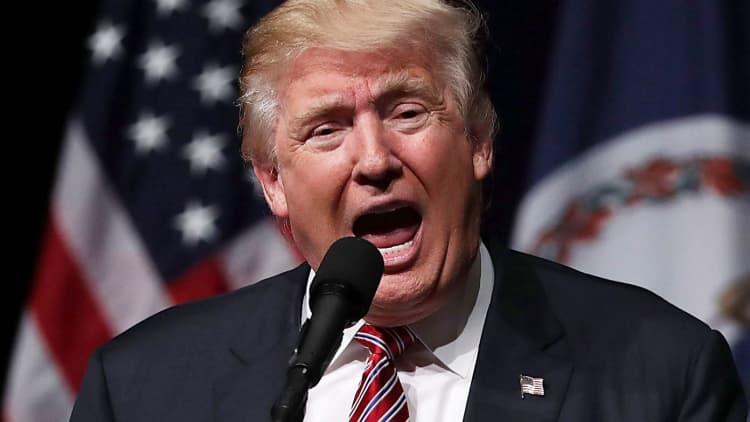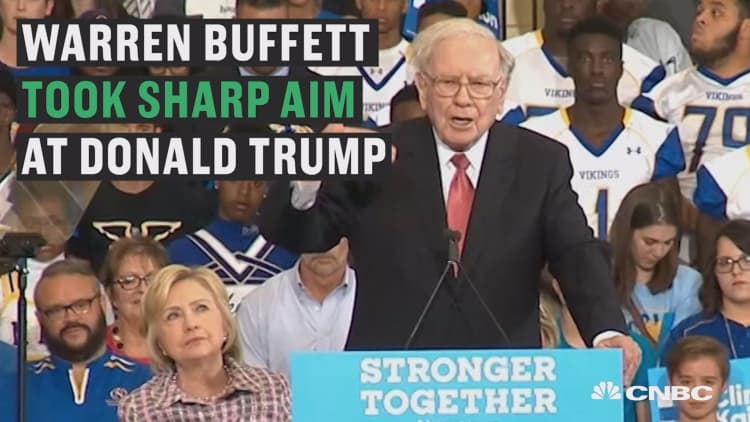The prospect of the outspoken billionaire businessman Donald Trump becoming the next U.S. president is making some European leaders nervous – and in some cases nauseous.
French President Francois Hollande said on Tuesday that a victory for Republican president candidate Trump would cause a right-wing shift in global politics and that the Republican presidential candidate "makes you want to retch."
Speaking to journalist in Paris, the socialist leader said Trump's recent war of words with the Muslim parents of a U.S. soldier who was killed in action, were "hurtful and humiliating comments."
"His excesses make you want to retch, even in the United States, especially when — as in the case with Donald Trump — he speaks ill of a soldier, of the memory of a soldier," Hollande told journalists in Paris, according to various media reports.
"If the Americans choose Trump, (it) will have consequences, because an American election is a world election," he added.
Trump has courted controversy throughout his campaign to secure the Republican nomination having offended Mexicans, Muslims and women with a series of contentious policies and unguarded comments. For others fed up with the political establishment however, Trump represents a breath of fresh air.
Needless to say, Trump is a polarizing figure for voters and politicians in the U.S. and those watching his progress from afar.
Hollande's comments come after Italian Prime Minister Matteo Renzi told CNBC on Monday that he would prefer Democrat Hillary Clinton to win the election in November, saying it was an "obvious" choice.
"I think it is obvious for me and for a lot of us to prefer Hillary Clinton as commander-in-chief, because with her, there is a woman able to know every dossier, able to have a history and a future with all the partners," Renzi told CNBC on Monday.
Refugees and Russia
Never one to lose an opportunity to stir up controversy, Trump has been forthright in his criticism of U.S. foreign policy and has offended several European countries and their leaders, most notably attacking German Chancellor Angela Merkel's refugee policy.
Trump said earlier this year that Merkel's decision to allow thousands of migrants fleeing war in the Middle East to enter Germany was "insane" and that the country had been "totally destabilized now."
"I don't believe it'll ever be the same, maybe in 200 years but it'll never be the same and Germany of all countries, I cannot believe they allowed this to happen," Trump told a U.S. radio station in April.
Most recently, Trump raised concern in the Baltic states of Lithuania, Latvia and Estonia by saying that, if he was U.S. president, he would not necessarily defend those countries should Russia – which has conducted some provocative military exercises in the Baltic region – invade them.
Adding insult to injury, Trump said that NATO, a military alliance forged during the Cold War to counter the perceived threat from Russia, was defunct.
Worryingly for those living in the Baltic states, which have a large pro-Russian community as a lasting legacy of Soviet occupation, Trump expressed support for Russia's annexation of Crimea from Ukraine – an act that prompted the international community to impose sanctions on Russia.
Somewhat unsurprisingly, Russian President Vladimir Putin sees Trump as a potential ally, calling the U.S. politician a "very colorful and talented man" in December.
What about the 'special relationship'?



The U.K. and U.S. have always held close to an idea of a "special relationship" backed up by a shared language and cultural connections. There is no guarantee that relationship would last should Trump be elected to the White House, however.
Trump hasn't had much time to offend the country's new Prime Minister Theresa May, who swiftly took over after David Cameron resigned in the wake of the Brexit vote, though she might take offence at several of his comments about women in politics (namely Clinton) and the workplace.
May has already criticized Trump by hinting last year, when in office as home secretary, that he could be banned from the U.K. after his call for Muslims to be temporarily banned from entering the U.S.
Trump might have golf courses in Scotland, helping to boost the local economy, but he does not have friends in high places there either. In March, First Minister Nicola Sturgeon encouraged a group of young people to keep "our fingers crossed" against Donald Trump becoming the next U.S. president.


